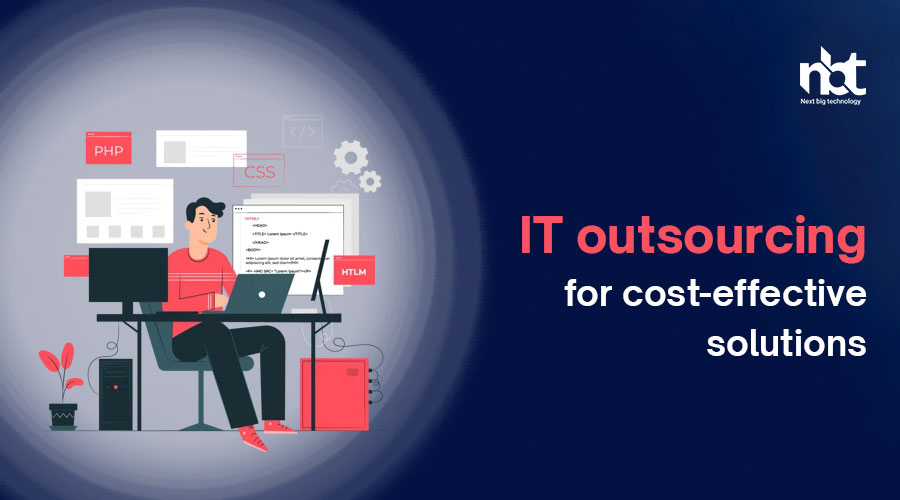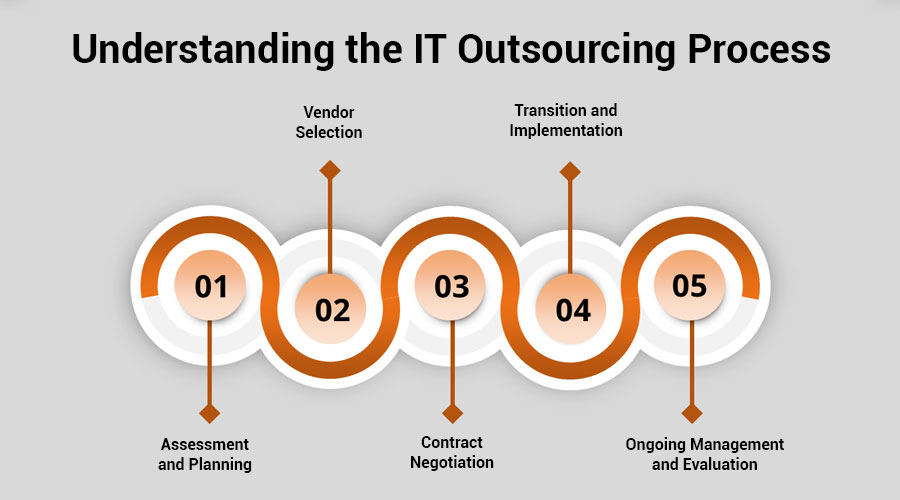Table of Contents
IT outsourcing for cost-effective solutions Services
In today’s competitive business landscape, staying ahead often means leveraging the latest technologies and digital solutions. However, for many companies, the prospect of developing and maintaining an in-house IT infrastructure can be daunting both in terms of costs and expertise. This is where IT outsourcing emerges as a strategic solution, offering cost-effective alternatives while ensuring optimal performance and efficiency.
Understanding IT Outsourcing IT outsourcing involves partnering with external service providers to handle various aspects of an organization’s IT needs. These services can range from software development and maintenance to infrastructure management, technical support, and cybersecurity. By outsourcing these functions, businesses can tap into specialized expertise without the need for significant investments in infrastructure, personnel, or training.
Cost-Effective Solutions: One of the primary benefits of IT outsourcing is its potential for cost savings. Outsourcing eliminates the need for upfront investments in hardware, software licenses, and infrastructure development. Instead, businesses pay for services on a subscription or project basis, allowing for greater flexibility and scalability. Moreover, outsourcing enables companies to avoid the overhead costs associated with hiring and retaining in-house IT staff, including salaries, benefits, and training expenses.
Access to Specialized Expertise: In addition to cost savings, IT outsourcing provides access to a vast pool of specialized expertise. Service providers often employ highly skilled professionals with expertise in specific technologies and domains. This means that businesses can benefit from the latest innovations and best practices without having to invest in continuous training or recruitment efforts. Whether it’s developing custom software applications, implementing cloud solutions, or enhancing cybersecurity measures, outsourcing partners can deliver tailored solutions to meet the unique needs of each client.
Focus on Core Competencies: By outsourcing non-core IT functions, businesses can redirect their resources and focus on core competencies. This allows organizations to concentrate their efforts on activities that directly contribute to their strategic objectives and competitive advantage. Rather than being bogged down by IT-related tasks, companies can allocate their time and resources more efficiently, driving innovation, growth, and customer satisfaction.
Enhanced Flexibility and Scalability: In today’s dynamic business environment, flexibility and scalability are essential for success. IT outsourcing offers the flexibility to scale resources up or down based on changing business needs and market conditions. Whether it’s expanding into new markets, launching new products, or responding to fluctuations in demand, outsourcing partners can adapt quickly to accommodate evolving requirements. This agility enables businesses to stay nimble and responsive in the face of uncertainty, driving sustainable growth and profitability.
How to Create a IT outsourcing for cost-effective solutions
In today’s fiercely competitive business landscape, staying ahead often requires leveraging the latest technological advancements. However, for many companies, building and maintaining an in-house IT infrastructure can be both financially burdensome and operationally complex. This is where IT outsourcing comes into play, offering a cost-effective solution that allows businesses to access top-tier expertise without breaking the bank. In this guide, we’ll explore the essential steps to creating an effective IT outsourcing strategy that maximizes cost efficiency while delivering optimal results.
- Define Your Objectives: Before diving into outsourcing, it’s crucial to clearly define your business objectives and IT needs. Whether it’s software development, network management, or technical support, identifying specific areas where outsourcing can add value is the first step towards creating a successful strategy.
- Evaluate Potential Providers: Once you’ve identified your outsourcing needs, the next step is to research and evaluate potential service providers. Look for companies with a proven track record of delivering quality services within your budget constraints. Consider factors such as expertise, experience, reliability, and scalability to ensure compatibility with your business requirements.
- Establish Clear Communication Channels: Effective communication is the cornerstone of successful outsourcing partnerships. Establish clear channels for communication, including regular meetings, status updates, and project tracking mechanisms. Define expectations, deliverables, and key performance indicators (KPIs) to keep both parties aligned throughout the engagement.
- Focus on Quality and Value: While cost efficiency is a primary driver for outsourcing, it’s essential not to compromise on quality. Prioritize providers who offer a balance between cost-effectiveness and value-added services. Look for certifications, testimonials, and case studies to gauge the quality of their work and ensure that they align with your standards.
- Embrace Flexibility and Adaptability: The IT landscape is constantly evolving, and your outsourcing strategy should reflect this dynamic nature. Choose providers who demonstrate flexibility and adaptability in responding to changing business needs and technological advancements. This ensures that your outsourcing partnership remains relevant and responsive to emerging challenges and opportunities.
- Implement Robust Security Measures: Data security is a paramount concern when outsourcing IT services, particularly in light of increasing cyber threats. Prioritize providers with stringent security protocols and compliance measures to safeguard your sensitive information. Establish clear data protection policies and contractual agreements to mitigate risks and ensure regulatory compliance.
- Monitor Performance and Provide Feedback: Regularly monitor the performance of your outsourcing partners against predefined KPIs and benchmarks. Provide constructive feedback to address any issues or areas for improvement promptly. Continuous evaluation and refinement are essential for optimizing the effectiveness and efficiency of your outsourcing arrangements over time.
- Cultivate a Collaborative Partnership: Beyond transactional relationships, aim to cultivate a collaborative partnership with your outsourcing providers. Foster open communication, trust, and mutual respect to foster innovation and drive shared success. By viewing outsourcing as a strategic partnership rather than a mere cost-saving measure, you can unlock additional value and competitive advantages for your business.
Why Should You Go for IT outsourcing for cost-effective solutions
In today’s dynamic business landscape, staying competitive often hinges on the ability to harness cutting-edge technology. For many organizations, the question of whether to handle IT needs in-house or outsource them to external experts is a critical one. While each approach has its merits, the trend towards IT outsourcing is gaining momentum, and for good reason. Let’s delve into why opting for IT outsourcing can provide cost-effective solutions for businesses of all sizes.
- Cost Efficiency: One of the primary reasons companies turn to IT outsourcing is the potential for significant cost savings. By outsourcing IT functions, businesses can avoid hefty investments in infrastructure, technology, and personnel. Instead of bearing the burden of recruiting and training IT staff, managing salaries, and dealing with overhead costs, outsourcing allows organizations to access top-tier talent and resources at a fraction of the cost. This cost predictability makes budgeting easier and enables businesses to allocate funds strategically towards core operations and growth initiatives.
- Access to Specialized Expertise: IT outsourcing opens the door to a vast pool of specialized expertise. Partnering with an experienced IT outsourcing provider grants access to professionals with diverse skill sets and industry-specific knowledge. Whether it’s software development, cybersecurity, cloud computing, or data analytics, outsourcing firms bring years of experience and best practices to the table. This access to specialized talent ensures that businesses can leverage the latest technologies and innovative solutions to drive efficiency and achieve their strategic objectives.
- Focus on Core Competencies: By entrusting IT functions to external partners, organizations can concentrate their time, energy, and resources on core competencies. Rather than getting bogged down in the intricacies of managing IT infrastructure or troubleshooting technical issues, businesses can devote their attention to activities that directly contribute to their bottom line. This laser focus on core competencies enhances productivity, accelerates innovation, and fosters agility, allowing companies to adapt swiftly to evolving market demands and seize growth opportunities.
- Scalability and Flexibility: Another advantage of IT outsourcing is the scalability and flexibility it affords businesses. Outsourcing agreements can be tailored to meet the fluctuating needs and growth trajectories of organizations. Whether scaling up during peak periods or downsizing during lean times, outsourcing provides the flexibility to adjust resources and services accordingly. This scalability eliminates the need for costly infrastructure upgrades or downsizing initiatives, ensuring that businesses remain agile and responsive in a dynamic business environment.
- Risk Mitigation: Cybersecurity threats, data breaches, and regulatory compliance are among the foremost concerns facing businesses today. Partnering with a reputable IT outsourcing provider can help mitigate these risks. Outsourcing firms invest heavily in robust security measures, compliance protocols, and disaster recovery plans to safeguard their clients’ data and systems. By leveraging the expertise and resources of outsourcing partners, businesses can bolster their cybersecurity posture, achieve regulatory compliance, and mitigate the potential impact of security breaches or downtime.
Market Prospects of IT outsourcing for cost-effective solutions and Platforms
In today’s rapidly evolving technological landscape, businesses are constantly seeking innovative solutions to stay competitive while managing costs effectively. One strategy that has gained significant traction is IT outsourcing. By entrusting certain tasks or processes to external vendors, companies can leverage specialized expertise and resources without the burden of maintaining an in-house team.
The market prospects of IT outsourcing for cost-effective solutions and platforms are undeniably promising. As businesses increasingly rely on digital infrastructure to streamline operations and reach customers, the demand for IT outsourcing services continues to grow. From software development and infrastructure management to cybersecurity and cloud computing, there is a wide range of areas where outsourcing can offer substantial benefits.
One of the primary advantages of IT outsourcing is its cost-effectiveness. By outsourcing non-core functions to regions with lower labor costs or leveraging economies of scale through established outsourcing providers, companies can significantly reduce operational expenses. This cost-saving potential is particularly appealing for startups and small to medium-sized enterprises (SMEs) looking to optimize their budgets while accessing top-notch technical expertise.
Moreover, IT outsourcing enables businesses to scale their operations more flexibly. Instead of investing in hiring and training additional staff to meet fluctuating demands, companies can easily adjust their outsourcing agreements to accommodate changing requirements. This scalability ensures that organizations can adapt to market dynamics and seize growth opportunities without being constrained by internal resource limitations.
Another compelling aspect of IT outsourcing is its role in driving innovation. By collaborating with specialized vendors and tapping into diverse talent pools, companies can access cutting-edge technologies and best practices that may not be readily available internally. This enables businesses to stay ahead of the curve and continually enhance their products and services to meet evolving customer expectations.
Furthermore, IT outsourcing offers valuable strategic advantages beyond cost savings and innovation. By offloading routine tasks to external partners, companies can free up internal resources to focus on core business functions and strategic initiatives. This allows organizations to allocate their talent and energy more efficiently, fostering a culture of productivity and agility.
When it comes to platforms, IT outsourcing plays a crucial role in enabling businesses to harness the power of digital ecosystems. Whether it’s leveraging third-party software-as-a-service (SaaS) solutions or integrating with external platforms for seamless connectivity, outsourcing providers offer the expertise and infrastructure needed to navigate complex technological landscapes. This enables companies to build scalable and interoperable systems that drive efficiency and enhance collaboration across the organization.
Essential Features of a IT outsourcing for cost-effective solutions
In today’s fast-paced digital landscape, businesses are constantly seeking innovative solutions to stay competitive while managing costs effectively. IT outsourcing has emerged as a strategic approach for companies to streamline operations, access specialized expertise, and drive cost efficiencies. However, not all outsourcing arrangements are created equal. To truly reap the benefits of IT outsourcing for cost-effective solutions, businesses need to understand the essential features that make such partnerships successful.
- Customized Service Offerings: One size does not fit all when it comes to IT outsourcing. Businesses should look for service providers that offer customized solutions tailored to their specific needs and objectives. Whether it’s software development, infrastructure management, or technical support, the outsourcing partner should align their services with the unique requirements of the business.
- Scalability and Flexibility: As businesses evolve and grow, their IT needs may change. Therefore, it’s crucial to partner with an outsourcing provider that offers scalability and flexibility in their services. Whether it’s scaling up resources during peak periods or adjusting services based on changing priorities, flexibility ensures that businesses can adapt quickly to market demands without incurring unnecessary costs.
- Cost-Effective Pricing Models: The primary motivation behind IT outsourcing is to reduce costs without compromising on quality. Effective outsourcing partners offer transparent and flexible pricing models that align with the budgetary constraints of the business. Whether it’s a fixed-price contract, pay-as-you-go model, or outcome-based pricing, the right pricing structure can significantly impact the cost-effectiveness of the outsourcing arrangement.
- Proven Track Record and Expertise: When entrusting critical IT functions to a third-party provider, businesses need assurance that they are working with a reputable and experienced partner. It’s essential to evaluate the outsourcing provider’s track record, industry experience, and technical expertise before making a decision. Case studies, client testimonials, and certifications can provide valuable insights into the provider’s capabilities and reliability.
- Robust Security Measures: Data security is a top concern for businesses outsourcing IT functions, particularly in light of increasing cybersecurity threats. A reliable outsourcing partner should have robust security measures in place to protect sensitive information and mitigate risks effectively. This includes adherence to industry standards, compliance with data protection regulations, and proactive measures to detect and respond to security breaches.
- Effective Communication and Collaboration: Seamless communication and collaboration are essential for the success of any outsourcing engagement. Businesses should look for providers that prioritize open and transparent communication channels, regular progress updates, and collaborative decision-making processes. Effective communication fosters trust and alignment between the business and the outsourcing partner, leading to better outcomes and cost savings.
- Continuous Monitoring and Performance Management: IT outsourcing is not a one-time transaction but an ongoing partnership that requires continuous monitoring and performance management. Businesses should establish clear metrics, key performance indicators (KPIs), and service level agreements (SLAs) to measure the effectiveness and efficiency of the outsourcing arrangement. Regular performance reviews and feedback sessions ensure that both parties are accountable for delivering value and driving cost savings.
Advanced Features of IT outsourcing for cost-effective solutions
In today’s fast-paced digital landscape, businesses are constantly seeking innovative strategies to stay ahead of the competition while maximizing their operational efficiency and minimizing costs. One such strategy that has gained immense popularity in recent years is IT outsourcing. While outsourcing IT functions initially gained traction for its cost-saving benefits, it has evolved to offer a plethora of advanced features that can revolutionize the way businesses operate. Let’s delve into some of the advanced features of IT outsourcing that can provide cost-effective solutions for businesses.
- Access to Specialized Expertise: One of the key advantages of IT outsourcing is the access to a vast pool of specialized expertise. By partnering with outsourcing providers, businesses can tap into the knowledge and skills of professionals who are experts in their respective fields. Whether it’s software development, cybersecurity, cloud computing, or data analytics, outsourcing allows businesses to leverage the expertise of specialists without the need for extensive in-house resources and training.
- Scalability and Flexibility: IT outsourcing offers unparalleled scalability and flexibility, allowing businesses to adapt to changing demands and requirements quickly. Whether it’s scaling up operations during peak seasons or downsizing during lean periods, outsourcing providers can easily adjust resources to meet the fluctuating needs of their clients. This flexibility ensures that businesses can maintain optimal efficiency without being burdened by fixed overhead costs.
- 24/7 Support and Maintenance: In today’s digital age, downtime can have detrimental effects on business operations. Advanced IT outsourcing services often include round-the-clock support and maintenance, ensuring that critical systems and applications remain operational at all times. This proactive approach to maintenance minimizes the risk of costly downtime and ensures uninterrupted service delivery to customers.
- Advanced Security Measures: With cyber threats on the rise, cybersecurity has become a top priority for businesses of all sizes. Leading IT outsourcing providers invest heavily in advanced security measures to protect their clients’ sensitive data and intellectual property. From robust firewalls and intrusion detection systems to regular security audits and updates, outsourcing partners employ cutting-edge technologies and best practices to safeguard against cyber threats.
- Cost-Effective Solutions: While cost savings are often the primary driver behind IT outsourcing, advanced outsourcing solutions go beyond mere cost reduction. By leveraging economies of scale, outsourcing providers can offer cost-effective solutions that deliver exceptional value to their clients. From streamlined processes and optimized workflows to reduced time-to-market and enhanced productivity, outsourcing can drive significant cost savings while improving overall business performance.
- Focus on Core Competencies: Outsourcing non-core functions allows businesses to focus their resources and attention on core competencies and strategic initiatives. By delegating routine tasks and IT functions to outsourcing partners, businesses can free up valuable time and resources that can be reinvested in innovation, growth, and value creation. This strategic focus enables businesses to stay agile and competitive in today’s dynamic marketplace.
- Global Delivery Model: Advanced IT outsourcing providers often operate on a global delivery model, leveraging a network of offshore, nearshore, and onshore resources to deliver cost-effective solutions with global reach. This global delivery model allows businesses to tap into diverse talent pools and geographical markets, enabling them to expand their operations and reach new customers without the need for extensive infrastructure investment.
IT outsourcing for cost-effective solutions Timelines
In today’s fast-paced business landscape, staying competitive means leveraging the latest technologies and maintaining a strong digital presence. However, for many organizations, managing IT infrastructure and development projects in-house can be both costly and time-consuming. This is where IT outsourcing emerges as a strategic solution, offering cost-effective alternatives and streamlined timelines for businesses of all sizes.
Cost-Effective Solutions:
Outsourcing IT services allows businesses to access a pool of skilled professionals without the need for extensive investment in infrastructure, training, and recruitment. By partnering with offshore or nearshore vendors, companies can benefit from reduced labor costs while maintaining high-quality standards.
Cost savings in IT outsourcing extend beyond labor expenses. It eliminates the need for purchasing and maintaining expensive hardware and software, as well as overhead costs associated with housing an in-house IT team. Additionally, outsourcing providers often operate in regions with lower living expenses, translating to more competitive pricing for their services.
Timely Delivery:
One of the significant advantages of IT outsourcing is its potential to expedite project timelines. Outsourcing partners specialize in delivering projects efficiently, leveraging their expertise and experience to meet deadlines consistently. These providers adhere to strict timelines and project milestones, ensuring that deliverables are completed on schedule.
Moreover, outsourcing allows businesses to scale resources according to project requirements. Whether it’s a short-term development project or ongoing IT support, outsourcing vendors can quickly allocate additional manpower or adjust project scopes to accommodate changing needs, thereby minimizing delays and bottlenecks.
Key Considerations:
While IT outsourcing offers numerous benefits, selecting the right vendor is crucial for achieving desired outcomes. Here are some key considerations:
- Expertise and Experience: Evaluate the outsourcing provider’s expertise in relevant technologies and industry-specific knowledge. Look for certifications, case studies, and client testimonials to gauge their capabilities.
- Communication and Collaboration: Effective communication is essential for successful outsourcing partnerships. Ensure that the vendor maintains transparent communication channels and fosters collaboration throughout the project lifecycle.
- Quality Assurance: Quality should never be compromised for the sake of cost savings or speed. Seek vendors with robust quality assurance processes and a commitment to delivering high-quality solutions that meet your standards.
- Data Security and Compliance: Protecting sensitive data is paramount, especially in industries like healthcare, finance, and e-commerce. Choose outsourcing partners with robust security measures and compliance certifications to safeguard your organization’s information.
How Much Does It Cost to Build a IT outsourcing for cost-effective solutions?
In today’s fast-paced digital landscape, businesses are constantly seeking innovative solutions to stay ahead of the curve while optimizing costs. One such strategy gaining traction is IT outsourcing, offering cost-effective solutions without compromising on quality or efficiency. However, the question remains: How much does it truly cost to build an IT outsourcing solution tailored to your specific needs?
Understanding the various cost factors involved is crucial for making informed decisions and maximizing the benefits of outsourcing. Let’s delve into the key elements that contribute to the overall cost of establishing an IT outsourcing framework:
- Scope and Complexity: The scope and complexity of your project significantly influence the cost of outsourcing. Projects with extensive requirements and intricate functionalities typically entail higher costs due to the increased time and resources required for development and management.
- Technology Stack: The choice of technology stack plays a pivotal role in determining costs. Different technologies have varying licensing fees, development complexities, and maintenance requirements. Opting for open-source technologies or cloud-based solutions can often provide cost advantages without compromising performance.
- Geographical Location: The location of your outsourcing partner impacts costs due to variations in labor rates and overhead expenses. Offshore destinations such as India, Eastern Europe, or Southeast Asia often offer competitive rates compared to onshore options. However, it’s essential to balance cost savings with factors like time zone differences and cultural compatibility.
- Quality and Expertise: While cost savings are a primary driver for outsourcing, prioritizing quality and expertise is equally crucial. Choosing a reputable outsourcing provider with a track record of delivering high-quality solutions may incur higher initial costs but can result in long-term benefits through enhanced productivity and reduced rework.
- Project Management and Communication: Effective project management and communication are essential for the success of outsourced projects. Investing in robust communication channels, project tracking tools, and dedicated project managers can streamline workflows, mitigate risks, and ensure alignment with business objectives. However, these investments may add to the overall cost of outsourcing.
- Scalability and Flexibility: Building scalability and flexibility into your outsourcing model enables your business to adapt to changing requirements and market dynamics seamlessly. While this may entail additional upfront costs for implementing scalable architectures and agile processes, it offers long-term cost efficiencies by avoiding costly reconfigurations or rebuilds in the future.
- Security and Compliance: In today’s cybersecurity landscape, prioritizing security and compliance is non-negotiable. Implementing robust security measures, compliance frameworks, and data protection protocols is essential for safeguarding sensitive information and mitigating regulatory risks. While these measures may incur upfront costs, they are indispensable for maintaining trust and credibility in the digital age.
- Total Cost of Ownership (TCO): It’s essential to consider the total cost of ownership (TCO) when evaluating outsourcing options. TCO encompasses not only the initial development and implementation costs but also ongoing maintenance, support, and upgrade expenses over the solution’s lifecycle. Calculating TCO enables businesses to make informed decisions and assess the long-term value proposition of outsourcing.
How to Create a IT outsourcing for cost-effective solutions – Team and Tech Stack
In today’s competitive business landscape, organizations are continually seeking innovative ways to optimize their operations while keeping costs under control. One effective strategy that many businesses turn to is IT outsourcing. By leveraging external expertise and resources, companies can access top-tier talent and cutting-edge technologies without the hefty investment required for in-house development.
However, successful IT outsourcing goes beyond merely finding a vendor and delegating tasks. It requires careful planning, strategic decision-making, and meticulous execution. In this guide, we’ll delve into the essential steps for creating an IT outsourcing strategy that delivers cost-effective solutions, focusing on building the right team and selecting the appropriate tech stack.
Understanding Your Requirements
Before embarking on your IT outsourcing journey, it’s crucial to have a clear understanding of your business requirements and objectives. Start by identifying the specific tasks or projects you intend to outsource and outline the desired outcomes. Whether it’s software development, infrastructure management, or customer support, defining your needs will guide you in selecting the most suitable outsourcing partners.
Crafting Your Team
- Define Roles and Responsibilities: Clearly define the roles and responsibilities of both your in-house team and the outsourced team. Determine who will oversee the project, manage communication, and handle day-to-day operations.
- Selecting the Right Outsourcing Partner: Conduct thorough research to find reputable outsourcing vendors with relevant expertise and a proven track record. Look for companies that align with your business values, culture, and objectives.
- Effective Communication Channels: Establish open and transparent communication channels between your internal team and the outsourcing partner. Regular meetings, progress reports, and collaborative tools can facilitate seamless interaction and ensure everyone stays aligned throughout the project lifecycle.
- Cultural Understanding: Recognize and respect cultural differences that may exist between your team and the outsourced professionals. Foster a culture of inclusivity, understanding, and mutual respect to promote effective collaboration and minimize misunderstandings.
Building Your Tech Stack
- Assess Your Technology Needs: Evaluate your current technological infrastructure and determine which areas require improvement or enhancement. Identify the specific technologies, frameworks, and tools needed to support your outsourcing initiatives effectively.
- Scalability and Flexibility: Choose a tech stack that offers scalability and flexibility to accommodate future growth and evolving business requirements. Opt for modular architectures and cloud-based solutions that allow for easy scalability and integration.
- Security Considerations: Prioritize security when selecting technologies for your outsourcing projects. Ensure that the chosen tech stack complies with industry standards and best practices for data protection, encryption, and access control.
- Performance and Reliability: Select technologies renowned for their performance, reliability, and stability. Conduct thorough performance testing and analysis to identify any potential bottlenecks or scalability issues before deployment.
IT outsourcing for cost-effective solutions Process
In today’s fast-paced digital landscape, businesses are constantly seeking ways to optimize their operations while minimizing costs. One strategy that has gained immense popularity is IT outsourcing. By delegating certain tasks and projects to external service providers, companies can access specialized expertise, streamline processes, and achieve significant cost savings.
Understanding the IT Outsourcing Process
IT outsourcing involves the delegation of specific IT functions or processes to a third-party service provider. These functions can range from software development and maintenance to technical support and infrastructure management. The outsourcing process typically follows a structured approach:
- Assessment and Planning: The first step involves assessing the organization’s IT needs and identifying areas that can be outsourced. This may include evaluating existing systems, processes, and resources to determine the most suitable outsourcing strategy.
- Vendor Selection: Once the outsourcing requirements are defined, the next step is to select a suitable vendor or service provider. Factors such as expertise, experience, reputation, and cost are crucial considerations during the selection process.
- Contract Negotiation: After identifying a potential vendor, negotiations are conducted to finalize the terms of the outsourcing agreement. Key aspects include service level agreements (SLAs), pricing structures, delivery timelines, and intellectual property rights.
- Transition and Implementation: Once the contract is signed, the transition phase begins. This involves transferring responsibilities, knowledge, and resources from the organization to the outsourcing partner. Effective communication and collaboration are essential to ensure a smooth transition process.
- Ongoing Management and Evaluation: Post-implementation, the outsourcing arrangement requires ongoing management and evaluation to ensure adherence to SLAs, quality standards, and budget constraints. Regular performance reviews and feedback mechanisms help in identifying areas for improvement and optimization.
Benefits of IT Outsourcing for Cost-Effective Solutions
IT outsourcing offers several benefits that contribute to cost efficiency and overall business success:
- Cost Savings: Outsourcing allows companies to access skilled labor at lower costs compared to maintaining an in-house team. By leveraging economies of scale and offshore resources, organizations can significantly reduce labor, infrastructure, and operational expenses.
- Access to Specialized Expertise: Outsourcing partners often possess specialized skills and domain expertise that may not be available internally. This enables businesses to tackle complex IT projects more efficiently and effectively, leading to higher-quality outcomes.
- Flexibility and Scalability: Outsourcing provides businesses with the flexibility to scale resources up or down based on changing needs and market dynamics. Whether it’s ramping up development efforts for a new product launch or scaling back support during off-peak periods, outsourcing offers scalability without the overhead costs of maintaining a large in-house team.
- Focus on Core Competencies: By outsourcing non-core IT functions, organizations can focus their internal resources and efforts on core business activities that directly contribute to their strategic objectives. This allows for greater innovation, agility, and competitive advantage in the marketplace.
- Risk Mitigation: Outsourcing can help mitigate risks associated with technology investments, talent shortages, and market fluctuations. Service providers assume responsibility for managing certain risks, such as infrastructure maintenance, cybersecurity, and regulatory compliance, thereby allowing businesses to focus on core risk management strategies.
Next Big Technology – Your Trusted IT outsourcing for cost-effective solutions Partner
In the ever-evolving landscape of technology, staying ahead of the curve is essential for businesses to thrive. As companies seek to streamline their operations, reduce costs, and enhance efficiency, the importance of IT outsourcing cannot be overstated. Amidst the myriad of options available, Next Big Technology emerges as your trusted partner for cost-effective solutions that propel your business towards success.
With a track record of excellence spanning years, Next Big Technology has established itself as a beacon of reliability in the realm of IT outsourcing. Whether you’re a startup looking to establish your digital presence or a multinational corporation aiming to optimize your IT infrastructure, Next Big Technology offers tailored solutions to meet your unique needs.
One of the key advantages of partnering with Next Big Technology is their commitment to delivering results while keeping costs in check. By outsourcing your IT needs to Next Big Technology, you gain access to a pool of highly skilled professionals without the overhead costs associated with maintaining an in-house team. This translates to significant savings for your business, allowing you to allocate resources where they’re needed most.
Moreover, Next Big Technology prides itself on its agility and adaptability. In a rapidly changing technological landscape, flexibility is paramount, and Next Big Technology excels in this regard. Whether you require software development, web design, mobile app development, or digital marketing services, Next Big Technology has the expertise and resources to deliver top-notch solutions that align with your business objectives.
Furthermore, Next Big Technology places a strong emphasis on communication and transparency throughout the outsourcing process. From the initial consultation to project delivery, you’ll have clear visibility into the progress of your project, ensuring that your requirements are met every step of the way. This commitment to open communication fosters trust and collaboration, laying the foundation for successful long-term partnerships.
In addition to its commitment to excellence and affordability, Next Big Technology places a premium on innovation. The team is constantly exploring emerging technologies and trends to ensure that their clients stay ahead of the competition. By harnessing the latest tools and techniques, Next Big Technology empowers businesses to innovate and thrive in today’s dynamic marketplace.
Enterprise IT outsourcing for cost-effective solutions
In today’s competitive business landscape, enterprises are constantly seeking ways to optimize their operations while reducing costs. One effective strategy that has gained significant traction in recent years is IT outsourcing. By entrusting certain aspects of their IT infrastructure and services to third-party vendors, enterprises can unlock a myriad of benefits, including cost savings, access to specialized expertise, and increased focus on core business objectives.
Cost-effective solutions lie at the heart of enterprise IT outsourcing. By leveraging the services of external providers, organizations can significantly reduce their operational expenses associated with maintaining an in-house IT department. These expenses often include salaries, benefits, training, and infrastructure costs. Outsourcing allows enterprises to convert fixed IT costs into variable costs, enabling them to scale resources up or down as needed, thereby aligning IT expenditure with business demand.
Moreover, outsourcing providers often operate on a global scale, tapping into cost advantages offered by offshore locations where skilled labor is available at a fraction of the cost compared to domestic markets. This global delivery model enables enterprises to access a diverse talent pool without compromising on quality, thus driving down overall IT expenditure.
In addition to cost savings, enterprise IT outsourcing offers access to specialized expertise that may not be readily available in-house. Outsourcing providers typically employ teams of highly skilled professionals with specialized knowledge across various IT domains, including cybersecurity, cloud computing, data analytics, and software development. By tapping into this expertise, enterprises can benefit from best practices, innovative solutions, and industry insights that can drive operational efficiency and accelerate digital transformation initiatives.
Furthermore, outsourcing IT services allows enterprises to redirect internal resources towards core business functions and strategic initiatives. By offloading routine IT tasks such as infrastructure management, maintenance, and support to external providers, organizations can free up valuable time and resources that can be reinvested in driving innovation, improving customer experiences, and gaining a competitive edge in the market.
To maximize the benefits of enterprise IT outsourcing, organizations must adopt a strategic approach to vendor selection, contract negotiation, and relationship management. It is crucial to carefully evaluate potential outsourcing partners based on their track record, technical capabilities, security protocols, and cultural fit. Establishing clear communication channels, service level agreements (SLAs), and key performance indicators (KPIs) is essential to ensure alignment between the enterprise’s objectives and the outsourcing provider’s deliverables.
Top IT outsourcing for cost-effective solutions Company
In today’s fast-paced digital landscape, businesses are increasingly turning to IT outsourcing to streamline operations, reduce costs, and stay competitive. However, with a plethora of options available, finding the right outsourcing partner can be a daunting task. To simplify your search, we’ve curated a list of the top IT outsourcing companies renowned for providing cost-effective solutions without compromising on quality.
-
-
Next Big Technology:

Focus Area
- Mobile App Development
- App Designing (UI/UX)
- Software Development
- Web Development
- AR & VR Development
- Big Data & BI
- Cloud Computing Services
- DevOps
- E-commerce Development
Industries Focus
- Art, Entertainment & Music
- Business Services
- Consumer Products
- Designing
- Education
- Financial & Payments
- Gaming
- Government
- Healthcare & Medical
- Hospitality
- Information Technology
- Legal & Compliance
- Manufacturing
- Media
-
- Accenture: With its extensive network of delivery centers across the globe, Accenture is a top choice for businesses seeking cost-effective IT outsourcing solutions. Leveraging cutting-edge technologies such as AI and cloud computing, Accenture helps organizations drive efficiency and achieve digital transformation goals while adhering to strict budgetary constraints.
- Tata Consultancy Services (TCS): As one of the largest IT services firms in the world, TCS excels in providing cost-effective outsourcing solutions tailored to meet the unique needs of each client. From software development to business process outsourcing, TCS leverages its global delivery model and deep industry expertise to deliver value-driven outcomes within stipulated budgets.
- Cognizant: Specializing in digital, technology, consulting, and operations services, Cognizant is a trusted partner for businesses seeking cost-effective IT solutions. By harnessing the power of automation and analytics, Cognizant helps clients optimize processes, reduce operational costs, and drive business growth in a highly competitive market landscape.
- Wipro: With a strong focus on innovation and customer-centricity, Wipro is a leading provider of IT outsourcing services aimed at delivering tangible business results at optimal costs. From IT infrastructure management to application development and maintenance, Wipro’s robust delivery framework ensures timely delivery and cost-efficiency without compromising on quality.
- IBM Global Services: Leveraging its extensive industry experience and technological prowess, IBM Global Services offers a wide range of IT outsourcing solutions designed to address the evolving needs of modern businesses. Whether it’s managing complex IT environments or driving digital transformation initiatives, IBM Global Services is synonymous with cost-effective excellence.
- HCL Technologies: Known for its customer-centric approach and commitment to innovation, HCL Technologies delivers value-driven IT outsourcing solutions that help businesses achieve their strategic objectives within budgetary constraints. From IT infrastructure services to application development and testing, HCL Technologies’ flexible engagement models ensure optimal cost savings and performance.
- Capgemini: With a focus on delivering business outcomes through technology-enabled solutions, Capgemini is a preferred choice for organizations seeking cost-effective IT outsourcing services. By leveraging its deep industry expertise and global delivery capabilities, Capgemini helps clients drive efficiency, reduce costs, and enhance competitiveness in a rapidly evolving marketplace.
Add Comparison Table IT outsourcing for cost-effective solutions
In the dynamic landscape of modern business, staying competitive while managing costs is a constant challenge. For many companies, Information Technology (IT) is both a crucial aspect of operations and a significant expense. This is where IT outsourcing comes into play as a cost-effective solution worth considering. In this article, we’ll delve into the benefits of IT outsourcing and compare various options through a comprehensive comparison table.
What is IT Outsourcing?
IT outsourcing involves contracting third-party service providers to handle IT functions and tasks on behalf of a company. These services can range from software development and maintenance to infrastructure management and technical support. By outsourcing these responsibilities, businesses can leverage external expertise and resources while focusing on their core competencies.
Benefits of IT Outsourcing:
- Cost Savings: One of the primary advantages of IT outsourcing is cost savings. By outsourcing IT services, businesses can avoid the hefty expenses associated with hiring and training in-house IT staff, as well as investing in infrastructure and technology upgrades. Outsourcing allows for more predictable budgeting with fixed or variable pricing models.
- Access to Expertise: IT outsourcing provides access to a vast pool of specialized talent. Service providers often have teams of experienced professionals with diverse skill sets, enabling businesses to tap into specialized knowledge without the need for extensive recruitment efforts.
- Focus on Core Activities: By entrusting IT functions to external providers, businesses can redirect their focus and resources towards core activities that directly contribute to their strategic objectives. This enhanced focus on core competencies can lead to increased efficiency and productivity.
- Scalability and Flexibility: IT outsourcing offers scalability and flexibility to accommodate fluctuating business demands. Whether scaling up during periods of growth or downsizing to cut costs, outsourcing allows businesses to adjust their IT resources according to their current needs without long-term commitments.
Comparison Table:
| Aspect | In-house IT | Offshore Outsourcing | Nearshore Outsourcing |
|---|---|---|---|
| Cost | High initial investment | Lower cost per hour | Moderate cost |
| Expertise | Limited specialized skill | Access to global talent | Access to regional talent |
| Communication | Direct and immediate | Time zone differences | Minimal time zone gap |
| Control | Full control | Less direct control | Moderate control |
| Cultural Alignment | High cultural alignment | Potential cultural gaps | Closer cultural alignment |
| Time to Market | Longer lead times | Shorter lead times | Moderate lead times |
FAQs on IT outsourcing for cost-effective solutions
In today’s fast-paced digital landscape, businesses are constantly seeking ways to streamline their operations while keeping costs in check. IT outsourcing has emerged as a viable solution for organizations looking to leverage external expertise and resources to meet their technological needs. However, navigating the realm of IT outsourcing can be daunting, especially for those new to the concept. To shed light on this crucial aspect of modern business strategy, let’s delve into some frequently asked questions (FAQs) on IT outsourcing for cost-effective solutions.
- What is IT outsourcing, and how does it work? IT outsourcing involves delegating specific IT functions or projects to third-party service providers. These providers, often located offshore or in different regions, offer expertise in areas such as software development, infrastructure management, cybersecurity, and technical support. Businesses collaborate with these external partners to fulfill their IT requirements efficiently.
- What are the primary reasons for outsourcing IT services? Businesses opt for IT outsourcing primarily to access specialized skills and resources that may not be available in-house. Additionally, outsourcing enables cost savings by reducing labor and infrastructure expenses. It also allows companies to focus on their core competencies while entrusting non-core IT functions to experts.
- How can IT outsourcing contribute to cost-effectiveness? IT outsourcing offers several cost-effective advantages, including reduced labor costs in regions where wages are lower than in-house options. Additionally, outsourcing eliminates the need for substantial investments in IT infrastructure and equipment. Furthermore, outsourcing partners often operate on a scalable model, enabling businesses to adjust resources based on fluctuating demand, thereby optimizing costs.
- What are the risks associated with IT outsourcing? While IT outsourcing presents numerous benefits, it’s not without its risks. Security concerns, such as data breaches or intellectual property theft, may arise when sharing sensitive information with external parties. Moreover, communication challenges due to language barriers or time zone differences can impede project progress. Selecting a reputable outsourcing partner and establishing clear communication channels are crucial for mitigating these risks.
- How do I choose the right IT outsourcing partner? Selecting the right outsourcing partner involves thorough research and evaluation. Consider factors such as the provider’s expertise, experience, reputation, and track record. Assess their technical capabilities, quality assurance processes, and adherence to security standards. Additionally, seek client references and testimonials to gauge their reliability and customer satisfaction levels.
- What measures can I take to ensure a successful IT outsourcing engagement? Effective communication is paramount to the success of an IT outsourcing engagement. Clearly define project requirements, expectations, timelines, and deliverables from the outset. Establish regular communication channels and checkpoints to monitor progress and address any issues promptly. Foster a collaborative relationship built on trust and transparency to maximize the benefits of outsourcing.
- How can I measure the ROI of IT outsourcing? Measuring the return on investment (ROI) of IT outsourcing involves evaluating both quantitative and qualitative factors. Assess cost savings achieved through reduced operational expenses, increased efficiency, and improved productivity. Additionally, consider qualitative aspects such as enhanced innova
Thanks for reading our post “IT outsourcing for cost-effective solutions”. Please connect with us to learn more about the IT outsourcing.
















